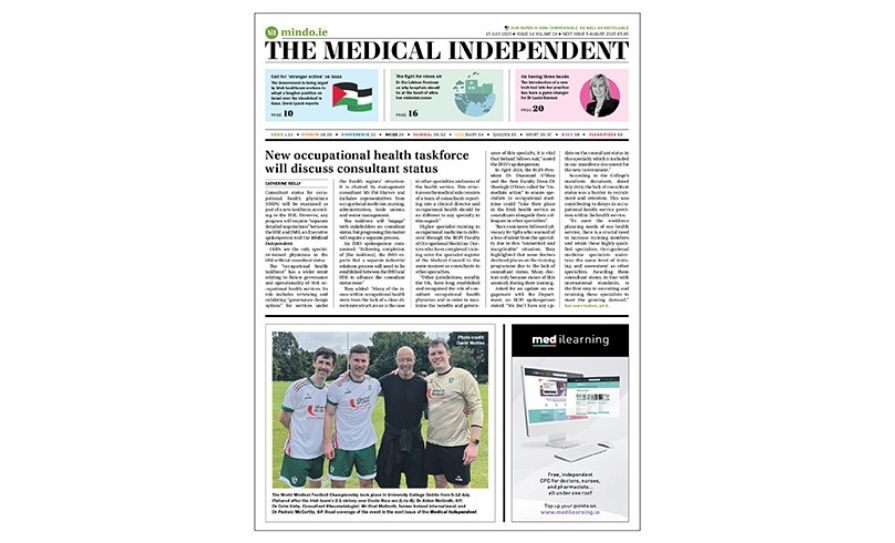The US group Physicians for Human Rights (PHR) focuses on using medicine and science to stem human rights violations around the world. However, it now finds itself working to address the concerns of citizens at home as lack of access to healthcare along with income inequality are seen as undermining the rights of a growing number of Americans.
For a start, the Nobel laureate group has expressed concern about the health issues relating to the treatment of Central American immigrants at the US-Mexico border under President Donald Trump’s ‘zero tolerance’ immigration policy.
<img src=”../attachments/d0e7eac0-d4e8-4ee4-838d-98699fe75a62.JPG” alt=”” />
<strong>US President Donald Trump</strong>
Under that policy, at least 2,000 children were separated from their parents or other adults who were charged with entering the country illegally between April 19 and May 31.
“Thousands of medical voices from across the United States joined forces with Physicians for Human Rights to urge the Trump administration to immediately halt the separation of migrant and asylum-seeking children from their parents at the US-Mexico border,” Ms Kathryn Hampton, Asylum Network Programme Officer for PHR, told the <strong><em>Medical Independent</em></strong> (<strong><em>MI</em></strong>).
The pressure paid off and by 20 June the President reversed course on the policy and signed an executive order to halt the practice.
But this has not assuaged concerns of medical groups as hundreds, if not thousands, of children still remain separated from their parents, despite a court ruling that they should be reunited. The administration has a list of nearly 3,000 children who might have been separated.
Health and Human Services (HHS) Secretary Mr Alex Azar said his department is working through each individual case file of the 11,800 “unaccompanied alien children”, who are now in the care of the HHS’s Office of Refugee Resettlement (ORR), to see which children were separated by immigration officials from parents at the border. But there is also mounting concern that families will now be detained together indefinitely.
“A letter, addressed to US Secretary of Homeland Security Kirstjen Nielsen and US Attorney General Jeff Sessions, signed by more than 20,000 experts across the health and child development fields, calling for swift action, was delivered to the administration by PHR in June. Forced separation of children and parents, especially in connection with the detention of a parent, can constitute an adverse childhood experience (ACE). ACEs are linked with disrupted neuro-development, resulting in social, emotional and cognitive impairment and have even been linked with negative intergenerational effects,” Ms Hampton emphasised.
<h3 class=”subheadMIstyles”>Toxic stress</h3>
Among health experts who have expressed concerns is the American Academy of Paediatrics. “We know that family separation causes irreparable harm to children,” the Academy said. “This type of highly stressful experience can disrupt the building of children’s brain architecture. Prolonged exposure to serious stress – known as toxic stress – can lead to lifelong health consequences.”
That consequence was also underlined by Dr Homer Venters, PHR’s Director of Programmes. “Extreme and repetitive stress – known as toxic stress – such as that experienced when a person is suddenly separated from parents, adversely affects brain development and is correlated with increased risk of developing chronic mental health conditions, such as depression and post-traumatic stress disorder (PTSD) and even physical conditions such as cancer, stroke, diabetes and heart disease.”
<img src=”../attachments/2f85a961-38bb-4f5f-864c-f42485c788d3.JPG” alt=”” />
<strong>Ms Kathryn Hampton</strong>
The long-term consequences are disturbing, Dr Venters told <strong><em>MI</em></strong>. “Separation from parents has been shown to be linked with higher rates of PTSD in the affected children. For children, separation results in a low-support environment that places them at increased risk of PTSD and depressive disorders. The negative impact on the cognitive and emotional functioning of the affected children can continue into adulthood and contribute to lower academic achievement, attachment difficulties and poor mental health.”
But regardless of whether children and their parents are detained together or separately, family detention in itself is detrimental, Ms Hampton said. “Family detention is not a neutral option. Extensive medical research shows that immigration detention is harmful and strongly correlated with negative mental health outcomes. Children who are detained have been shown to exhibit poor physical and psychological health even after a brief stay in detention, which increases the risk of long-term negative effects.
“Detention has a devastating impact on families, including from restrictions that constrain the ability of parents to respond to their child’s needs in a normal manner. It is imperative that the Trump administration swiftly reinstate community-based alternatives to detention, which are humane, effective in terms of both compliance and cost and which lessen trauma experienced by children and families.”
Ms Hampton is also alarmed that the Trump administration sought exemption from a 1997 US Supreme Court decision, known as the Flores agreement, that ruled children must be kept in the least restrictive setting possible and that Immigration and Customs Enforcement (ICE) residential facilities be licensed by an appropriate state agency to provide residential care for children.
The request was rejected by a federal judge on 9 July, but the administration could still decide to appeal that ruling.
“The request to modify Flores is a cynical effort to strip away basic legal protections for immigrant children and to institutionalise family detention under the guise of ending forced separation – a policy initiated by the Trump administration.
“Without state licensure, there would be no guarantee of adherence to existing minimum standards, which are designed to protect children and families. In practice, such a modification would legalise ad hoc detention sites, including tent cities on military bases. Families should be placed in community-based settings while their proceedings are pending and no detention facility should ever be exempt from state licensing requirements. Prolonged or indefinite detention violates the right to be free from torture and other cruel, inhuman, or degrading treatment.”
<h3 class=”subheadMIstyles”>Nobel prize</h3>
These are tough statements coming from an organisation more accustomed to looking outside the US to highlight health and human rights concerns. PHR’s forensic and research expertise is sought by governments, United Nations agencies, international and national courts, and other human rights organisations. In 1997, PHR shared the Nobel Peace Prize for medically documenting landmine injuries and serving as a leader in the International Campaign to Ban Landmines.
PHR teams exposed the use of chemical weapons against civilians in Iraq and carried out historic exhumations of mass graves in Bosnia and Rwanda for international tribunals. During the past decade, these teams have also provided evidence for criminal investigations into torture and extrajudicial executions in numerous countries – including Colombia, Honduras, Libya, Mexico, Peru and Sierra Leone – to ensure accountability for serious human rights violations and mass atrocities.
The PHR is not alone in its concerns. A number of other US medical groups, including the American College of Emergency Physicians, American Medical Association, American Psychiatric Association, American Psychological Association, American Public Health Association and the National Academy of Medicine, have also spoken out against President Trump’s immigration policies. On 18 June, in an interview on CBS television, Dr Colleen Kraft, President of the American Association of Paediatrics, who toured a facility in Texas housing immigrant children, went so far as to call the detentions “a form of child abuse”.
PHR’s intervention in domestic US events, however, is particularly significant and the organisation is also concerned about the consequences for Americans, especially those in poorer, rural areas, of President Trump’s travel ban on several Muslim-majority countries. This has been challenged in a number of US courts since it was announced by the White House last year but on 26 June the ban was upheld in a 5-4 ruling by the US Supreme Court.
Figures show that Americans, especially in rural areas, depend greatly on immigrant doctors to staff local clinics. Immigrants make up 22 per cent of the health workforce and 30 per cent of doctors and surgeons in the US, according to data from the Migration Policy Institute.
Iran and Syria, two of the countries whose citizens are no longer allowed entry to the US, are the sixth and 10th largest contributors, respectively, to the US health workforce. “So we’re talking about substantial representation from these countries (in the medical workforce),” according to Ms Jeanne Batalova, the Migration Policy Institute’s senior policy analyst and demographer.
When you break it down by medical specialty, foreign-trained doctors do a disproportionate amount of the work in certain areas. They make up more than 50 per cent of geriatric medicine doctors, almost half of nephrologists, nearly 40 per cent of internal medicine doctors, and nearly a quarter of family medicine physicians, according to data from the Association of American Medical Colleges.
The President’s immigrant ban will thus be felt in hospitals and clinics across the nation, PHR says, and will have an especially chilling effect on the provision of healthcare to poorer patients.
PHR described the disturbing case of one surgeon (<strong>panel, p21</strong>) who would now be blocked from coming to the US under the President’s travel ban. But it’s not only physicians who are impacted. “More than 25 per cent of home health aides are immigrants – as many as 50 per cent in California and 66 per cent in New York,” Ms Hampton told <strong><em>MI</em></strong>.
It’s not only the travel ban, but also other sweeping changes being made to immigration policy across the board, which are likely to negatively impact access to healthcare. “For example, the administration has refused to agree to solutions for those who came to the US as children, also known as ‘dreamers’ or recipients of DACA (Deferred Action for Child Arrivals), a policy introduced by former President Obama and which Trump has decided not to extend. At least 20 per cent of DACA recipients work in the healthcare industry and the impact of these policies will be felt from hospitals to outpatient clinics and cancer treatment centres to home care settings,” Dr Venters told <strong><em>MI</em></strong>.
<img src=”../attachments/9f1d6e03-4ae6-475d-9cc2-721d1320c712.JPG” alt=”” />
<strong>Dr Homer Venters</strong>
PHR also sees the increasing lack of access to healthcare and health insurance as another disturbing trend and echoes the concerns of a United Nations report in May on the state of poverty in the United States. More than 40 million Americans live in poverty, according to the US Census.
The UN report notes that the US has the highest child mortality rate of 20 rich countries (OPEC comparison). It also has among the highest child poverty rates in the developed world, at 21 per cent. The report also examined the country’s obesity rates and income inequality and criticised policies it said are exacerbating this situation.
It says Trump’s policies seem “deliberately designed to remove the basic protections from the poorest, punish those who are not in employment and make even basic healthcare into a privilege to be earned rather than a right of citizenship”.
<h3 class=”subheadMIstyles”>Obamacare</h3>
Since President Trump’s election the Republican-controlled Congress has tried and failed a number of times to repeal the health insurance plan introduced by Trump’s predecessor, President Obama. But Trump has continued in his efforts to stall Obamacare by refusing to continue certain funding mechanisms.
The Trump administration’s suspension over the summer of billions of dollars in payments to Obamacare insurers that help make premiums affordable, especially for low-income Americans, has sparked widespread alarm both among the healthcare community and insurance providers themselves. “This suspension will significantly increase 2019 premiums for millions of individuals and small business owners and could result in far fewer health plan choices,” Ms Scott Serota, CEO of the health insurance provider Blue Cross Blue Shield Association, said in a statement. “It will undermine Americans’ access to affordable coverage, particularly those who need medical care the most.”
For its part, the Trump administration rejected the report, arguing the UN should instead focus on poverty in the developing world. US Ambassador to the UN Ms Nikki Haley said: “It is patently ridiculous for the United Nations to examine poverty in America.” PHR strongly disagrees.
“PHR echoes the concerns of Special Rapporteur on Extreme Poverty, Mr Philip Alston, a pre-eminent global expert in human rights, in regard to access to healthcare in the US. Under international human rights law, the obligation of states to ensure individuals’ right of access to healthcare facilities, goods and services on a non-discriminatory basis also means that states must take positive measures to enable individuals to enjoy their right to health,” Ms Hampton told <strong><em>MI</em></strong>.
Dr Venters reinforced the point: “PHR is particularly concerned about the intersection of immigration policy and the right to the highest attainable standard of health. International law is clear that state obligations are valid in regard to all individuals under their jurisdiction without regard to immigration status. The UN Committee on Economic, Social and Cultural Rights has stated that states must refrain from limiting equal access to preventative, curative and palliative health services for all persons, including asylum-seekers and illegal immigrants.
“Changes to immigration enforcement in the United States have created many pressures on the ability of health professionals to provide ethical care, both in community and detention settings. Recent federal data illustrates a clear rise in US immigration enforcement targeting long-term residents without legal status, a departure from previous immigration enforcement efforts focused primarily on recent arrivals in the United States.”
<h3 class=”subheadMIstyles”>ICE</h3>
Ms Hampton stressed that these actions pose huge difficulties for healthcare workers in meeting patients’ needs. “As ICE [immigration agency] has increased its enforcement actions, health providers in community and detention settings alike have reported pressures in their ability to provide meaningful healthcare. In the community, these reports include ICE agents seeking to access protected health information of patients, or seeking to conduct operations within healthcare settings.”
She told <strong><em>MI</em></strong> that in detention facilities, reported practices by immigration agents include forcing health staff to use diagnostic and treatment approaches they know to be substandard. “As the backlog of detention cases grows, these reports are becoming more common,” she stressed.
An additional layer of concern for health professionals is the increased conflict between ICE enforcement and the sanctuary movement in a number of cities. This movement aims to provide refuge for immigrants, including in some hospitals and other health facilities. PHR says there has been a big increase in ICE activities around these healthcare facilities.
“Enforcement practices which are not consistent with human rights standards and medical ethics result in compromised care and access to services, both in detention and in the community. Examples of this include providing patient records and limiting care because of influence by ICE actions. Under domestic law, the Fourth Amendment to the US Constitution limits the reach of immigration enforcement, including in medical facilities.”
But despite PHR and other US medical groups highlighting their concerns about healthcare access, especially for vulnerable groups, the indications are that the Trump administration is likely to extend rather than roll back its hardline immigration policies.
This became apparent on 24 June when the President’s Defence Secretary James Mattis confirmed that the US is preparing to house immigrants at a number of military bases.
Although he did not cite how many people could be housed at the bases, the US military said it had been asked by the Department of Health and Human Services to get ready to house up to 20,000 immigrant children.
All of which is an alarming prospect for the Physicians for Human Rights, Ms Hampton said. “Treaties such as the International Convention on the Rights of the Child, the International Convention on Elimination of all forms of Discrimination against Women, the International Convention on the Elimination of Racial Discrimination and the International Convention on the Rights of Persons with Disabilities explicitly reinforce protections for vulnerable and marginalised groups.”
<p class=”captionMIstyles”>It is disturbing, even chilling, that in modern America such legal protections are now being invoked by a medical organisation more accustomed to ameliorating conditions for those in global conflict zones than for those in its own backyard.
<p class=”captionMIstyles”>
<div style=”background: #e8edf0; padding: 10px 15px; margin-bottom: 15px;”> <h3 class=”subheadMIstyles”>‘If Dr Saeed is not welcome in America, then who is?’</h3>
Ms Hampton shared the case with <strong><em>MI</em></strong> of a young Syrian surgeon, Dr Saeed, whose name she changed to protect his identity.
“Dr Saeed is a young surgeon from western Syria. After the conflict started in his country, he continued to perform surgery in the hospital where he worked, which is in an area controlled by opposition forces. After a local news report of Dr Saeed operating was uploaded to YouTube, he was arrested, detained and tortured for days. He was released on the condition that he only work in a government hospital.
“Not long afterwards, Dr Saeed’s brother and a friend were both victims of targeted killings. He feared that he would be next, so he fled to the United States and applied for asylum. Little did he know that, in today’s America, he would not be easily welcomed due to the policy changes initiated by the new administration. His case is in limbo, Dr Saeed now spends his time volunteering in a surgery research unit in the northeast United States while completing the painstaking process of converting his Syrian medical credentials into ones that are recognised by US institutions.
“A forensic evaluator volunteering for Physicians for Human Rights examined Dr Saeed in order to assess the severity and nature of his trauma symptoms. She found that he presented a clinical picture consistent with his narrative of having been tortured, exhibiting symptoms of post-traumatic stress disorder and major depressive disorder.
“His predicament begs the question: If someone as threatened and endangered as Dr Saeed is not welcome in America, then who is?
“Only 11 Syrian refugees have been admitted into the United States in 2018, despite the horrific and illegal use of chemical weapons throughout the conflict and the intentional targeting of healthcare and civilians, documented on an ongoing basis by PHR.
“After years of living in refugee camps, most displaced Syrians who manage to validate their asylum claims wait indefinitely for possible future resettlement, even after undergoing extreme vetting. The travel ban (by the Trump administration) allows for the possibility of a waiver if a denial would cause the applicant undue hardship.
<p class=”captionMIstyles”>“Some in the United States fear that asylum seekers like Dr Saeed may cause a threat to national security. This is, after all, part of the justification for the Trump administration’s ban. But the reality is that very few people seek asylum by choice. Most are forced from homes they love under extreme duress, and seek haven in lands far away because they have run out of other options to protect their lives and those of their families.”
</div>













Leave a Reply
You must be logged in to post a comment.